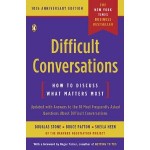 A poem that has always touched me, and to which I return often, is David Whyte‘s Self-Portrait. To me it speaks of the longing to live life courageously and passionately, and in a meaningful and connected way. I was not surprised (but I was pleased!) when I learned he had read this poem to a crowd of 3000 therapists at a recent Psychotherapy Networker conference (2010).
A poem that has always touched me, and to which I return often, is David Whyte‘s Self-Portrait. To me it speaks of the longing to live life courageously and passionately, and in a meaningful and connected way. I was not surprised (but I was pleased!) when I learned he had read this poem to a crowd of 3000 therapists at a recent Psychotherapy Networker conference (2010).
Learning from the N. Ireland Peace Negotiator
 Harri Holkeri, a former Finnish prime minister (1937-2011) who helped shepherd talks that led to the historic 1998 peace agreement in Northern Ireland, died this week in Helsinki. In a speech in 2008, Mr. Holkeri cited several reasons he and his colleagues were able to guide the long-divided parties to a deal. I wondered, as I read the NYTimes obituary, whether these might be helpful in navigating our own everyday disagreements and conflicts.
Harri Holkeri, a former Finnish prime minister (1937-2011) who helped shepherd talks that led to the historic 1998 peace agreement in Northern Ireland, died this week in Helsinki. In a speech in 2008, Mr. Holkeri cited several reasons he and his colleagues were able to guide the long-divided parties to a deal. I wondered, as I read the NYTimes obituary, whether these might be helpful in navigating our own everyday disagreements and conflicts.
Handling Tough Conversations
 One of my favorite books on the subject of handling tough conversations and situations is Difficult Conversations: How to Discuss What Matters Most (Stone, Patton, Heen & Fisher, 2010). Based on 15 years of work at the Harvard Negotiation Project and consultations with thousands of people struggling to communicate effectively in tough situations, the authors answer the question: When people confront the conversations they dread the most, what works?
One of my favorite books on the subject of handling tough conversations and situations is Difficult Conversations: How to Discuss What Matters Most (Stone, Patton, Heen & Fisher, 2010). Based on 15 years of work at the Harvard Negotiation Project and consultations with thousands of people struggling to communicate effectively in tough situations, the authors answer the question: When people confront the conversations they dread the most, what works?
Are You There for Me?
 Securely attached partners are better able to navigate the trials and tribulations that life has a habit of bringing our way. Knowing we have a safe and secure base from which we can draw sustenance and strength, and to which we can always return, allows us to go confidently out into the world.
Securely attached partners are better able to navigate the trials and tribulations that life has a habit of bringing our way. Knowing we have a safe and secure base from which we can draw sustenance and strength, and to which we can always return, allows us to go confidently out into the world.
This sort of secure attachment, teaches Susan Johnson (Emotional Focused Therapy), is shaped by mutual emotional accessibility and responsiveness. What may appear on the surface as fights about kids, money or sex, is really a fundamental challenge to whether the partner is emotional accessible and responsive. The underlying questions being asked in most such arguments are: Are you really there for me? Do I matter to you? Will you turn towards me and respond to me? How important am I to you?
What REALLY Turns People On?
 A new book entitled A Billion Wicked Thoughts: What the World’s Largest Experiment Reveals About Human Desire purports to have revealed profound differences between the sexual brains of men and women.
A new book entitled A Billion Wicked Thoughts: What the World’s Largest Experiment Reveals About Human Desire purports to have revealed profound differences between the sexual brains of men and women.
Two young cognitive neuroscientists who met as graduate students at Boston University, Ogi Ogas and Sai Gaddam claim to have studied the secret sexual behavior of more than a hundred million men and women around the world by observing what people do within the anonymity of the Internet. Alfred Kinsey, by comparison, personally interviewed some 18,000 subjects (middle-class Caucasians) in the 1950s.